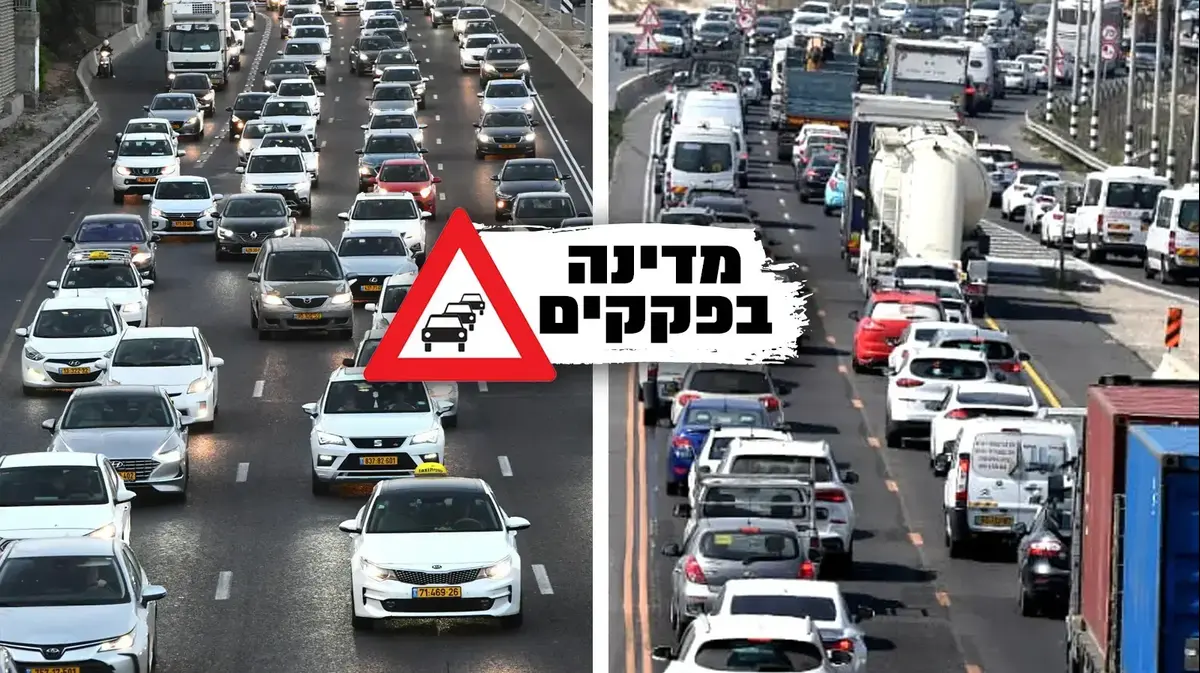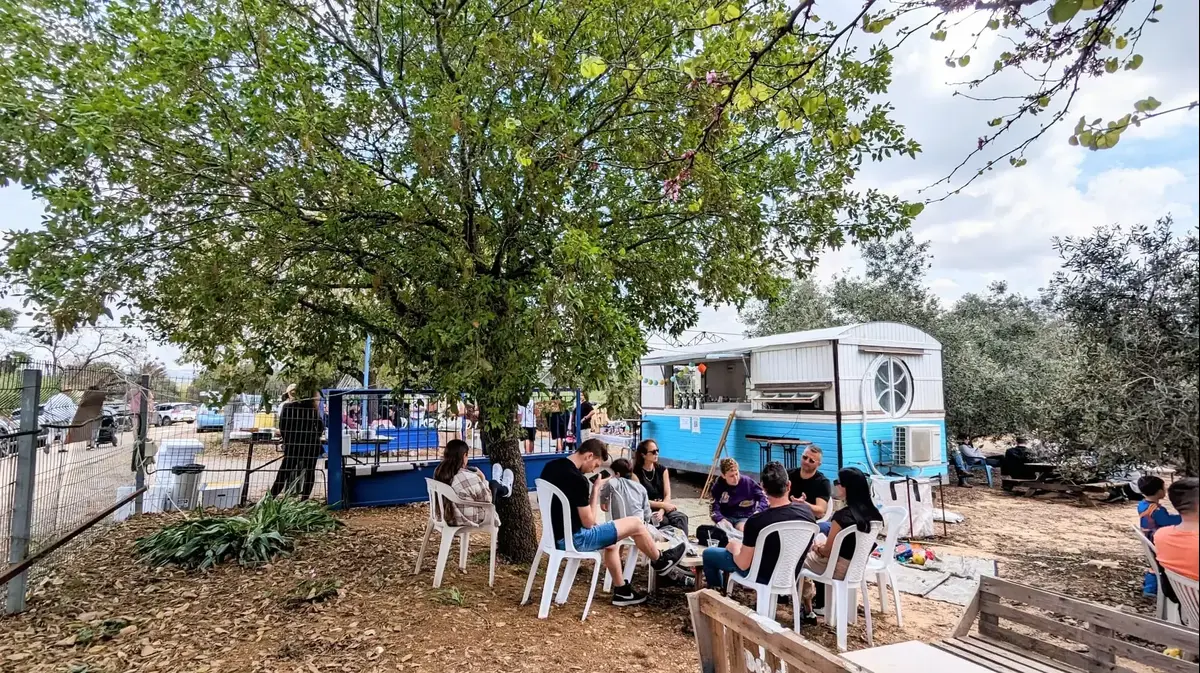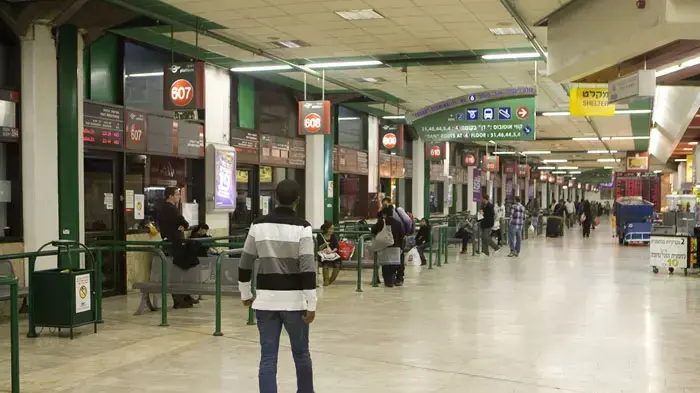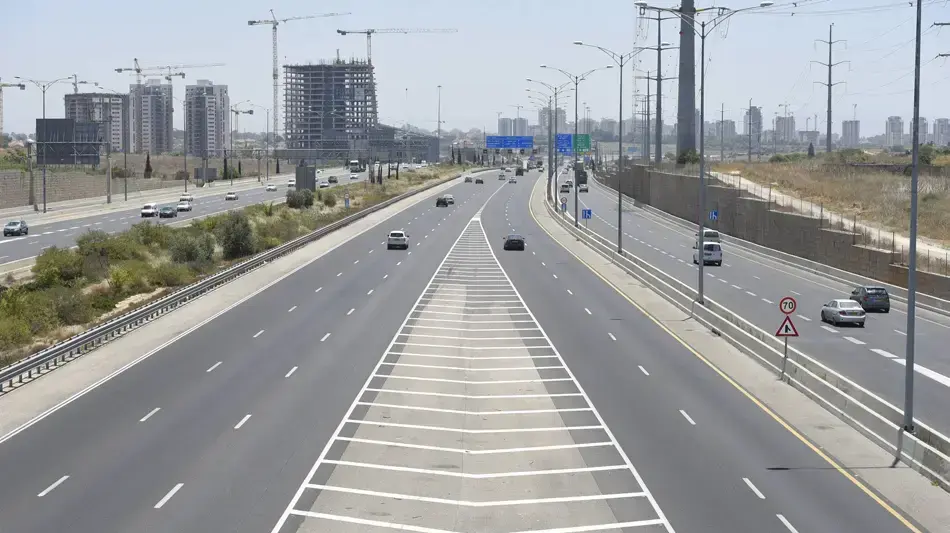The program will not solve the traffic jams in Ayalon, but maybe it will ease the congestion in the Tel Aviv area (Photo: Reuven Castro)
A city without trucks: will we soon be able to say goodbye to the sight of the trucks that crowd the streets of Tel Aviv and replace them with swarms of couriers and silent electric delivery vehicles?
According to the pilot that the municipality of Tel Aviv-Yafo is about to implement, this may be the new reality in the streets of the heart of the city.
But before we touch on the solution, for the benefit of those who don't crash into this reality every morning, here's a reminder of today's urban transportation madness.
An urban morning in Tel Aviv-Yafo, not yet 8:00 and the crowded entrances to the city are crowded in the long lines of cars, when the streets of the city itself are already deep in an attempt to contain the surge of traffic which is far beyond its normal capacity and especially during the excavation war that the city is in.
And in the midst of all this commotion of buses, cars, motorcycles, bicycles, scooters and pedestrians, the trucks that distribute the goods among the various businesses in the city also go by every morning.
Although these are a few percentages of the total number of vehicles that enter the city, their driving characteristics create "friction points" and interfaces that create traffic disturbances and disruption that is far beyond their relative share.
The need to stand on the main traffic routes for the duration of the unloading, in some cases while blocking the lane or the public transportation route, produces dozens of such centers at any given moment.
And when you put this disruption on top of the city's initially poor transportation starting point, you get a daily traffic catastrophe.
And this is even before factoring into this equation the safety and problematic aspect of the movement of large, bulky trucks, whose field of vision is limited, in a city where it seems that the only way to move at a satisfactory pace is on a two-wheeled vehicle, powered by gasoline, electricity or leg muscles.
And to these two aspects, transportation and safety, we should also add the economic aspect.
Amir Alon, the CEO of Globrands, with whom we spoke, describes the current situation as "catastrophic." According to him, for distribution rounds that include about 250 stores and involve the entry of between 6 and 8 trucks every day, they pay hundreds of thousands of shekels a year for reports provided by The dozens of inspectors who "hunt" the trucks. It turns out that the sign "Inspector, I'm unloading goods" has very little effect on the municipal enforcement bodies.
Reading car park today.
The area marked in red will become an open space (photo: Tel Aviv-Yafo Municipality)
Berlin, London, Paris, Tel Aviv?
"The transportation vision of the Tel Aviv Municipality puts pedestrians at the center,"
Laura Hoffmann Sheftler - Project Manager at the Transportation Authority of the Tel Aviv-Jaffa Municipality -
tells us , "but on the other hand, the transportation of goods should also be part of the picture."
And this conflict between creating a pedestrian-friendly urban living space and the need to provide a delivery service of goods to the businesses, the municipality wants to resolve by switching to the urban distribution of what is known as the "last mile" in transportation that does not involve the truck entering the crowded streets.
Its solution, which has already been running for several years in European cities such as Berlin, Paris and London in various adaptations, is the creation of complexes of logistics centers (marlogs), where the trucks will arrive, unload the goods in a centralized manner and from which the goods will be distributed to the businesses by a courier company using vehicles which are more suitable for urban traffic in terms of their size and propulsion.
"We anticipate that the trade changes that started with Corona, of the use of deliveries, will continue to increase. The use of Marlogs will save air pollution, improve safety and reduce congestion on the roads," she explains and touches on the three problematic points of truck traffic in the city, and of course the aspect of fines.
Hoffman Sheftler's concept of the management of public space does put pedestrians at the center, but does not ignore the commercial aspect necessary for the existence of a living city.
More in Walla!
Cut and save: an aesthetic checklist for the cold season
In collaboration with General Aesthetics
MRL Reading (Simulation) (Photo: Tel Aviv-Yafo Municipality)
Voluntarism, effectiveness and attractiveness
In the first phase of the pilot, three logistics centers will be operated for the distribution of the goods, two of which belong to the Coastal Estate chain in which the Tel Aviv Municipality is a partner - in the Sinerama parking lot and the Reading parking lot (where two sub-complexes will be operated).
A third complex will be built in the area to be rented in the Dizengoff Center parking lot.
The area that the Marlogs will cover, at least according to what is specified in the contract, is from Rokah Street in the north to Kibbutz Galyot in the south, as well as Highway 20 (Ayalon) as the eastern border of the sector.
The contract also states that in order to reduce as much as possible damage to the lives of the residents around the logistics centers, no discharge will be allowed between The hours 22:00 to 6:00 am and that the companies that win the tender will also be responsible for cleaning the place as well as for maintaining permissible noise levels, including a directive to bleed the heavy vehicles when they are not in motion for example.
It is also the company's responsibility to pay the costs associated with operating the parking lot (cleaning and security at Cinrama and Breeding) as well as payment of property tax for the use of the area.
According to estimates, this is an amount between 103 and 109 thousand shekels per year for each of the complexes in Reading and Cinerama (respectively).
In the complex that will be allocated for this purpose in the Dizengoff Center parking lot, which will be significantly reduced and on an area of only 90 square meters, the property tax cost is estimated at about NIS 36,000.
The project may completely change - not only the way goods move in the center of Tel Aviv-Yafo - but the overall fabric of life in the center the city, with the neutralization of the great mine of the traffic of these trucks in the dense volume. The advantage for the business owners can be reflected not only in their ability to generate confidence in the exact arrival time due to a reduced dependence on a long and inefficient round of the trucks, but also in the possibility of creating "leaner" inventory reserves due to The immediate delivery and the fact that short-term storage is not done with him.
At the same time, the municipality clarifies that the purpose of the logistics centers is not to serve as warehouses, but only as distribution and shipping stations to the business or its end customer.
The Sirma complex today.
The area marked in red is designated for the experimental MRL (Photo: Tel Aviv Municipality)
Here we are already entering the twilight zone that casts doubt on the ability of this venture, as smart, correct and necessary as it may be, to be a stable and attractive business ground for the distribution companies.
First, as far as the businesses themselves in the distribution area, the
use of that distribution company is purely voluntary
.
That is, the winning distribution company in the center will have to be attractive enough for business owners to make use of its distribution services, when the cost of the product they purchase from the supplier already includes the shipping cost.
Second - regarding the question
of effectiveness
.
The municipality admits that as of today, the information it has regarding the volume of trucks entering the city daily is only partial.
For example, the municipality does not have the possibility to make a distinction between a truck for the purpose of trade or for the purpose of building or transporting food (which, by the way, will be possible in the tender only for distribution companies that have a permit for this).
Part of the pilot activity was designed to produce an established database about this figure.
However, already in the draft tender, two goals are indicated that the distribution company will be required to meet - a reduction of at least 30% in the entry of heavy vehicles (over 3.5 and up to 12 tons) into the distribution area every day on average and a 50% reduction in the entry of heavy vehicles during peak hours (between the hours of 10:00 -18:00) as well as a reduction of at least 150 km per day in the amount of travel by the company's heavy vehicles compared to the situation before the operation of the logistics center.
Regarding the third question, the
attractiveness
, here is the most significant missing in this plan, and this missing is also what The distribution companies constitute a very problematic "dead space".
According to the tender, the delivery company's distribution will not only be to the businesses, which is known as B2B, but also distribution to the end customer, or as it is known as B2C, in such a case, for example, the businesses themselves may find themselves in a problem, when their suppliers may use the shipping companies and the logistics companies As a "shortcut" directly to the customer, one that was not possible for them relatively easily in the past. Which brings back the incentive of the businesses themselves to cooperate with the project as a whole.
In this aspect, it is good to express the concern of Amir Alon from "Globrands": "The municipality's initiative is welcome as an idea, But it must be understood that the suppliers and customers will cooperate with the municipality only if it guarantees that their situation will improve.
In order for us to express interest in taking part in the program, its economic model should be clearer."
Globrands is a natural candidate for this type of distribution structure as one of the leading distribution companies operating in the van sale method when it is focused on the import and marketing of smoking products, sweeteners and snacks, i.e. exactly the type of goods produced by an area cell that is "dotted" with a relatively large number of small distribution points (to which relatively small packages of goods are unloaded).
In Alon's view, as long as the activity of the marlogs is on a voluntary basis, companies have no possibility of producing a proper and well-founded business plan. At least at the current point in time, he sees no incentive for suppliers to enter into a plan that would force them to make changes that currently make no sense to their current operations. "Why should the players The different people want to win the tender, which means an investment in advance of building personnel and buying means of transportation, without any clear understanding or promise of how the business will be run?
In order for the project to be successful, it must have a clear economic feasibility based on which it will be possible to move forward.
As long as the joining is on a voluntary basis, I'm afraid that the business simply won't take off."
A planned MRL in the Cinerama complex (imaging) (Photo: Tel Aviv-Yafo Municipality)
And yet move?
In the bottom line, the Marlog project that may be a reality-changing factor in commercial-urban conduct is much more than another urban project. Mainly because, as the municipality knows, a change in the travel habits of residents and visitors can be guided from above by controlling parking resources or allocating alternative transportation to the private car - As far as things go in the trade sectors, it is about the need to harness each of the components of the supply chain to this change, all under conditions of uncertainty. By
the way, this is exactly the point where we would expect to see the state mobilize to support such ventures that have the ability to have an immediate and direct impact, but in the end In other words, it is once again the local government that demonstrates more flexibility and innovation than the central government.
With the publication of the tenders, the municipality also enters the preliminary phase in which the companies interested in participating in them will submit their questions until November 29, when the deadline for submissions is December 27.
According to the municipality, the signing of the contract with the winning company will be done within two months and immediately after that the activity in the field will begin.
Of money
Tags
Tel Aviv Municipality
trucks
Traffic jams















